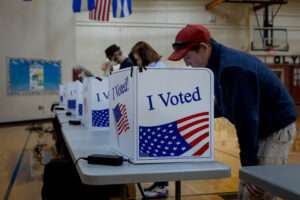The Volokh Conspiracy
Mostly law professors | Sometimes contrarian | Often libertarian | Always independent
More Evidence that Republicans are Now the Party that Benefits From High Voter Turnout
If the trend persists, it may lead to reconsideration of traditional partisan attitudes towards mandatory voting and other policies intended to increase turnout.

I have previously written about evidence indicating that, in the Trump era, Republicans are now the party that stands to benefit from relatively high voter turnout. A new New York Times/Siena study provides further confirmation:
In a reversal of one of the most familiar patterns in American politics, it appears that Donald J. Trump, not President Biden, would stand to gain if everyone in the country turned out and voted.
In New York Times/Siena College polls over the last year, Mr. Biden holds a wide lead over Mr. Trump among regular primary and midterm voters, yet he trails among the rest of the electorate, giving Mr. Trump a lead among registered voters overall….
The NYT/Siena study finds that people who voted in 2022 midterm primary elections favored Biden over Trump by a 49% to 44% margin, those who voted in 2022 general elections, but not primaries favored Biden by a slight 46-45 margin, those who voted in the 2020 election, but not midterms favored Trump 44-42; finally those who never voted before supported Trump by a large 49-35 margin.
As noted in my earlier post, the standard explanation for this shift is that the Trump-era GOP is strongest among lesser-educated voters, and they - in turn - are less likely to turn out. There is now a large "diploma gap" between Democratic and Republican voters.
The NYT analysis adds the point that high-turnout voters tend to be more supportive of abortion rights and more concerned about democracy-preservation. These are relatively strong issues for Biden. By contrast, low-frequency voters are more focused on short-term economic trends. This year, short-term economic issues are helping Trump, in part because of widespread voter ignorance about the true state of the economy and the causes of inflation (such ignorance tends to be more common among less-educated and less-engaged voters).
If the trend towards Republicans doing better among low-propensity voters continues, perhaps this will lead partisans to reconsider their traditional attitudes towards various policies intended to increase turnout, including mandatory voting. I discussed this possibility in my earlier post:
Traditionally, Democrats and progressives have been sympathetic to policies intended to increase voter turnout, while conservative Republicans have been highly skeptical. Advocates of the most extreme such policy—mandatory voting—have also mostly been on the left…..
Both sides in this debate cite high-minded, nonpartisan rationales for their positions…. But cynics have long wondered whether the real motive was partisan gain: perhaps liberal Democrats supported efforts to increase turnout because it would help them win, while conservative Republicans opposed them for the very same reason….
Recent polling trends may put both cynical and idealistic explanations for these views to the test. In the Trump era, it is increasingly Republican candidates—especially Trump himself—who stand to benefit from higher turnout.
For those interested, I have long been an opponent of mandatory voting, and a skeptic the supposed virtues of higher turnout. I held that view back when increasing turnout was expected to benefit Democrats, and still hold it today, when high turnout seems to advantage the GOP. I summarized the reasons why in my previous post:
I think most people do not have a duty to vote, even in high-stakes elections. And I have argued that relatively ignorant citizens can often do more good by abstaining from voting than by casting poorly informed votes (though I am also skeptical of arguments that government should try to weed out ignorant voters, primarily because I doubt that it can be trusted to do so in an unbiased way)…..
It isn't just that a more ignorant electorate is likely to make worse choices among the options before them. It is that those options are likely to be worse to begin with. Parties facing a relatively ignorant election are likely to select lower-quality candidates and policies than those facing a more knowledgeable one. I describe the logic behind this more fully in my book Democracy and Political Ignorance.
This connection between voter knowledge and relatively good policy outcomes is not an iron law. In Chapter 2 of my book, I go over some scenarios where voter ignorance can actually be beneficial. But I also explain why such situations are likely to be unusual.
It's possible that the Trump-era trend towards Republicans benefiting from higher turnout will prove to be an aberration. But if it continues and solidifies, I wonder if the partisans will gradually reverse positions on turnout issues. If it happens, it wouldn't be the first time that partisan advantage prevailed over consistent adherence to principle.


Show Comments (21)